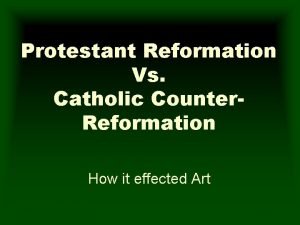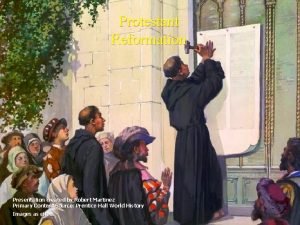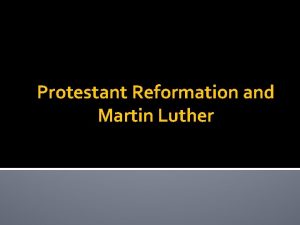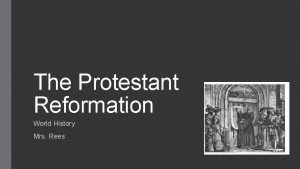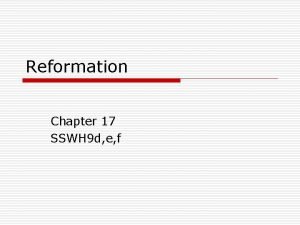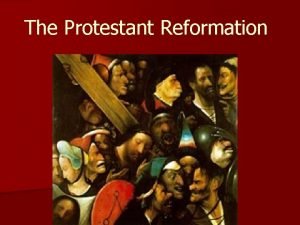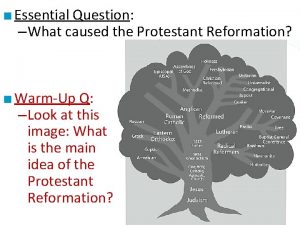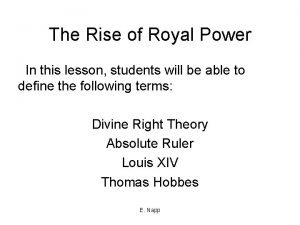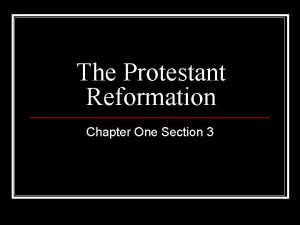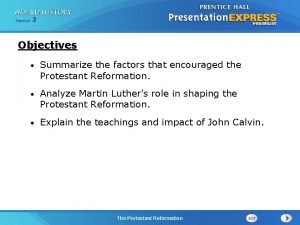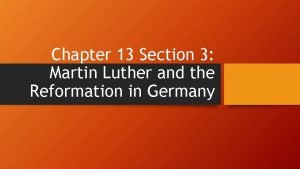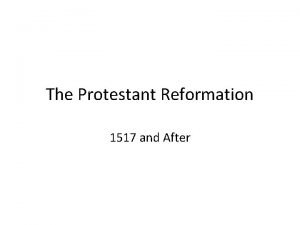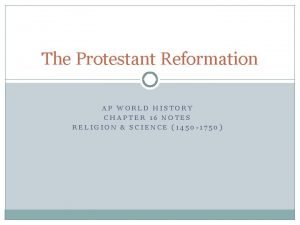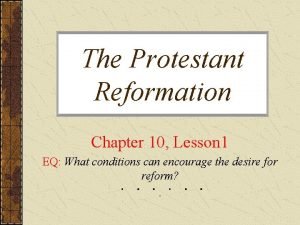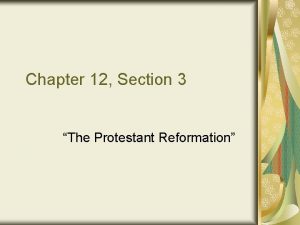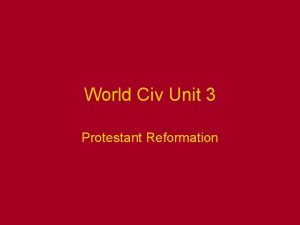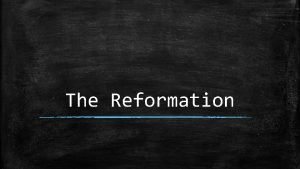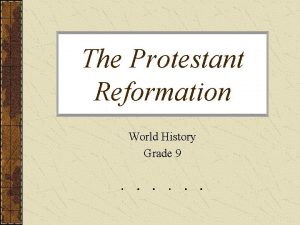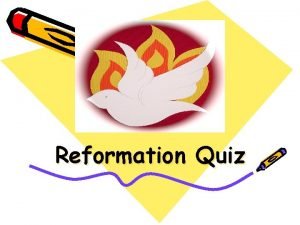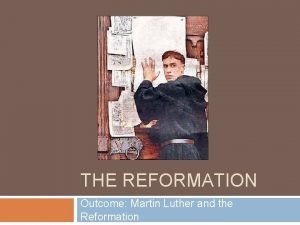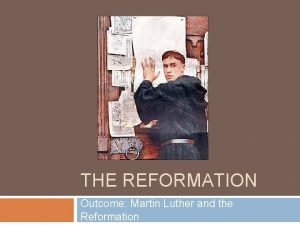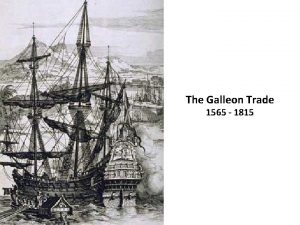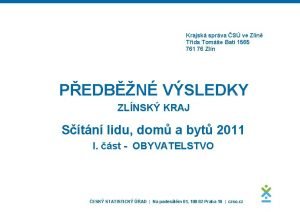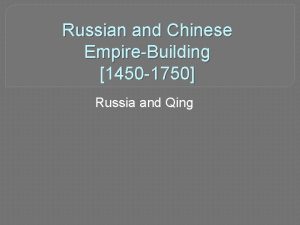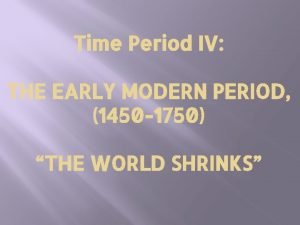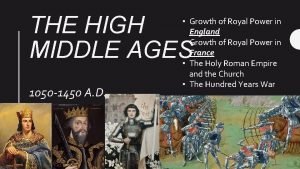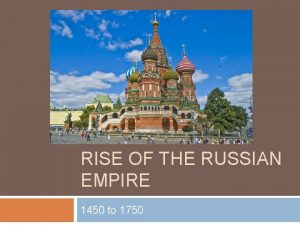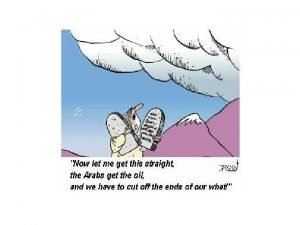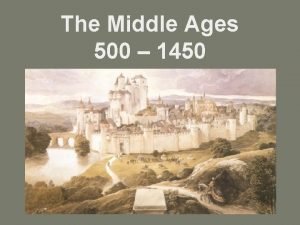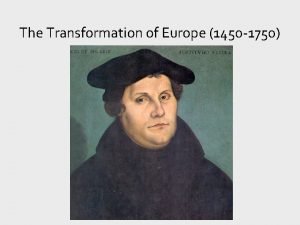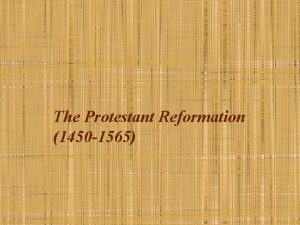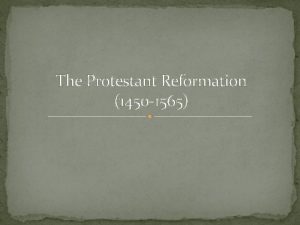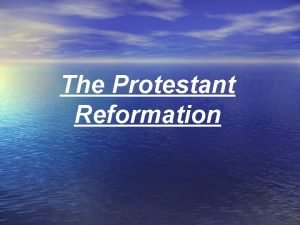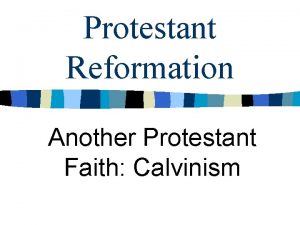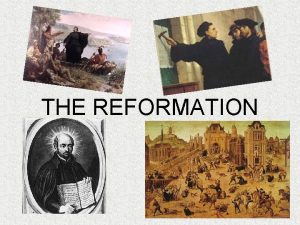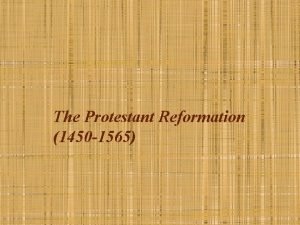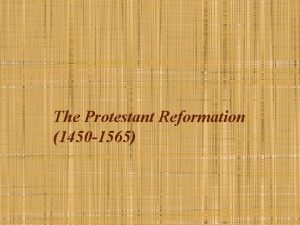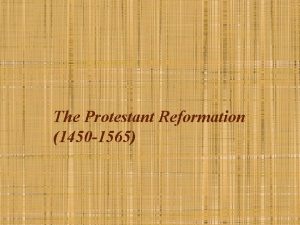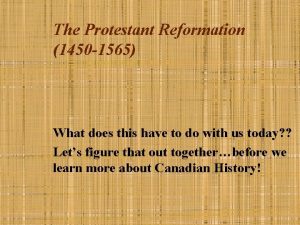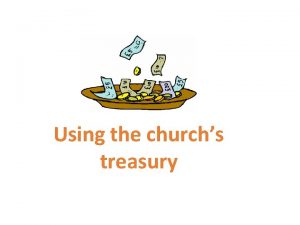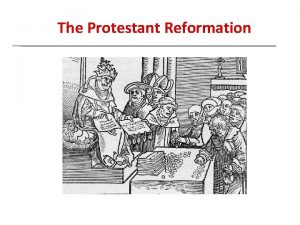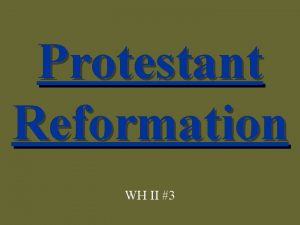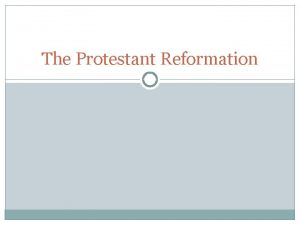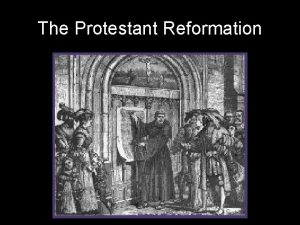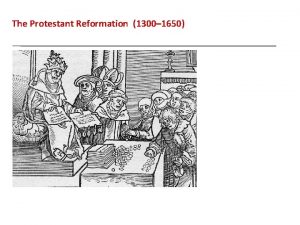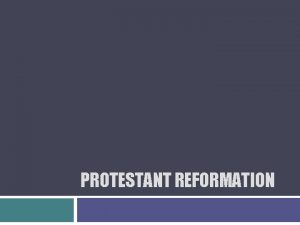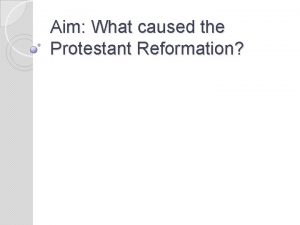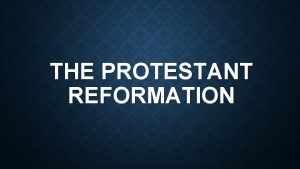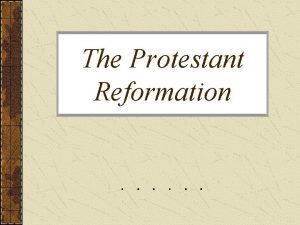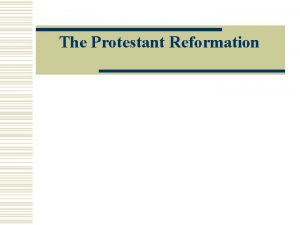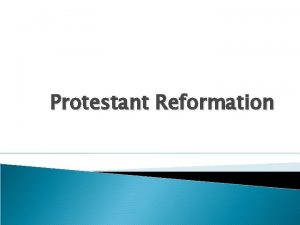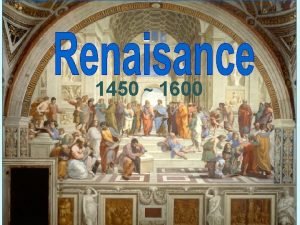The Protestant Reformation 1450 1565 I The Churchs


































- Slides: 34

The Protestant Reformation (1450 -1565)

I. The Church’s Problems • Charges of greed • Worldly political power challenged • Weariness of dependence on the Church and the constraints it enforced • Growing human confidence vs. “original sin” • Catholic church becomes defensive in the face of criticism • The confusing nature

I. The Church’s Problems (cont) • The corruption of the Renaissance Papacy --Rodrigo Borgia • European population was increasingly anticlerical • Absenteeism of church leaders --Antoine de Prat • The controversy over the sale of indulgences

II. Convergence of Unique Circumstances

A. Cultural • Better educated, urban populace was more critical of the Church than rural peasantry • Renaissance monarchs were growing impatient with the power of the Church • Society was more humanistic and secular • Growing individualism --John Wyclif

B. Technological: Printing Press • Invention of movable type was invented in 1450 by Johann Gutenberg • Manufacture of paper becomes easier and cheaper • Helped spread ideas before Catholics could squash them • Intensified intellectual criticism of the Church • Protestant ideals

C. Political

(1) England • Notion of the Renaissance Prince • Recent War of the Roses created a sense of political instability for the Tudor dynasty --Henry VIII • The significance of a male heir to the Tudors

(2) The Holy Roman Empire • Decentralized politics • Pope successfully challenged the monarch here • New HRE, Charles V, is young, politically insecure and attempting to govern a huge realm during the critical years of Luther’s protest • Charles V faced outside attacks from France and the Turks

D. Spiritual • Growing piety, mysticism and religious zeal among European masses • Dutch Christian humanist Erasmus inadvertently undermines the Church from within --In Praise of Folly (1510) • Call for a translation of the New Testament into Greek • Call for a return to the simplicity of the early

III. The Emergence of Protestantism in Europe

A. Germany (Northern) • Luther troubled by the sale of indulgences • Dominican friar Tetzel was selling indulgences in Wittenberg in 1517 • Luther posts his 95 theses on the door of the castle church in Wittenberg on October 31, 1517 • Some of Luther’s complaints • Luther slowly but

A. Germany (Northern) • Pope pays little attention to the Luther at first • Luther attacks the Pope and his bull of excommunication • Luther goes into hiding in 1521 -- “A Mighty Fortress is our God” • Constraints against the spread of Luther’s ideas • The Peace of

B. England • Henry VIII’s marriage to Catherine of Aragon • Henry seeks an annulment • Henry creates the Church of England establishes his own supremacy over it • A “political reformation” only at first • The six wives of

B. England (cont) • The brief reign of Edward VI • The rule of “Bloody” Mary • Return of the Marian exiles to England from Geneva -- “Puritans” • Queen Elizabeth I and the “Via Media” • The attack of the Spanish Armada in 1588 -- “The Protestant

C. Switzerland

(1) Zurich • Very urban, cosmopolitan setting • Reformer Ulrich Zwingli and his Old Testament persona • “Memorialist” view of the Mass • Zwingli also opposed purgatory, clerical celibacy, intercession of the saints, and salvation by works • The death of Zwingli

(2) Geneva (French-speaking) • John Calvin’s leadership in Geneva from 1541 -1564 • Geneva became the model Protestant training center • Stress on order and rigorous adherence to God’s law • A “Quasi-theocracy” • Very austere religion practiced in Geneva • Self-discipline and the

D. France • King Francis I was initially sympathetic to Luther as long as his ideas stayed in Germany • Protestantism made illegal in France in 1534 • Persecution of the Huguenots • St. Bartholomew’s Day Massacre • King Henry and the

E. Other Parts of Western Europe • No Protestant inroads into Spain or Italy • Protestantism succeeded only where it was urban and supported initially by the nobility • After 1540, no new Protestant territories outside of the Netherlands • Most powerful European nations were

IV. Reformation Ideas

A. Martin Luther (1483 -1546)

(1) Background • Luther’s early life • Luther’s sense of unworthiness and his fear of God • Luther’s understanding of “passive righteousness” • Luther’s confrontation with the Church • Luther’s marriage to Katherine von Bora

(2) Luther’s Teachings • “Sola Fidei” (Salvation by Faith Alone) • “Sola Scriptura” (Authority of the Scriptures Alone) --Luther’s German Translation of the New Testament • The Priesthood of All Believers --Peasant Revolt of 1525 • All Vocations are pleasing to God

B. John Calvin (1509 -1564)

(1) Background • More of a scholar than Luther • More of a systematic thinker than Luther • Calvin’s Institutes (1536) • Early legal training • Clear-cut moral directives for living • Relied on Scripture and Augustine primarily for his ideas

(2) Teaching • Predestination • The right of rebellion --English Civil War • More of a stress on works than Luther • Divine calling to all sorts of vocations • The “invisibility” of the True Church • Government serves the Church --Michael Servetus • Just war position • Calvin’s positions on communion and

C. Radical Reformers

(1) Background • Desire to return to the primitive, first-century Church • High standard of morality valued and pursued • Bitterly persecuted by both Catholics and other Protestants • The descendants of the “Anabaptists” • Ardent missionaries who were harassed for

(2) Teaching • Free will—all can be saved • Adult, “believer” baptism • Social and economic equality • Pacifism • Separation of Church and State • Unity of the “visible” and “invisible” Church • Stressed role of the Holy Spirit in the life of the believer—

V. The Counter-Reformation: The Catholic Response

Ingredients • Reformation shaped the form and rapidity of the Catholic response • Council of Trent (1545 -1563) • The Society of Jesus (“Jesuits”)— 1534 --Ignatius Loyola • The Inquisition • The Index • Renewed religious emotionalism --Baroque Art • Religious warfare and

VI. Results of the Reformation • Germany was politically weakened and fragmented • Christian Church was splintered in the West • 100 Years of Religious Warfare • Right of Rebellion introduced by both Jesuits and Calvinists • Pope’s power increased • Furthered societal individualism and

VI. Results of Reformation (cont) • Political stability valued over religious truth • Calvinism boosted the commercial revolution • Witch craze swept Europe in the 1600’s --Between 1561 -1670, 3000 people in Germany, 9000 people in Switzerland 1000 people in England were executed as witches
 Protestants vs catholic
Protestants vs catholic Encuesta de satisfacción para clientes de church's chicken
Encuesta de satisfacción para clientes de church's chicken Protestant reformation
Protestant reformation Protestant reformation political cartoon
Protestant reformation political cartoon Reformation rap
Reformation rap Counter reformation def
Counter reformation def The protestant reformation crossword puzzle
The protestant reformation crossword puzzle What caused the protestant reformation?
What caused the protestant reformation? Protestant reformation
Protestant reformation The renaissance and reformation section 3 quiz answer key
The renaissance and reformation section 3 quiz answer key What factors encouraged the protestant reformation?
What factors encouraged the protestant reformation? Chapter 13 section 3 the protestant reformation
Chapter 13 section 3 the protestant reformation Protestant reformation map
Protestant reformation map Reformation ap world history
Reformation ap world history The reformation in europe lesson 1
The reformation in europe lesson 1 Unit 12 lesson 3 the protestant reformation
Unit 12 lesson 3 the protestant reformation Unit 3: martin luther & the protestant reformation
Unit 3: martin luther & the protestant reformation Protestant beliefs
Protestant beliefs Protestant reformation kahoot
Protestant reformation kahoot Crash course protestant reformation
Crash course protestant reformation The protestant reformation quiz
The protestant reformation quiz The reformation outcome: martin luther and the reformation
The reformation outcome: martin luther and the reformation The reformation outcome martin luther and the reformation
The reformation outcome martin luther and the reformation 1565-1815
1565-1815 Heswita at dominikano
Heswita at dominikano Náboženství
Náboženství Russia 1450 to 1750
Russia 1450 to 1750 Aegean art
Aegean art World map 1450
World map 1450 1450 ad
1450 ad Russian empire innovations 1450 to 1750
Russian empire innovations 1450 to 1750 1250 bc
1250 bc 500/1450
500/1450 Renaissance historical events
Renaissance historical events Europe 1450
Europe 1450
